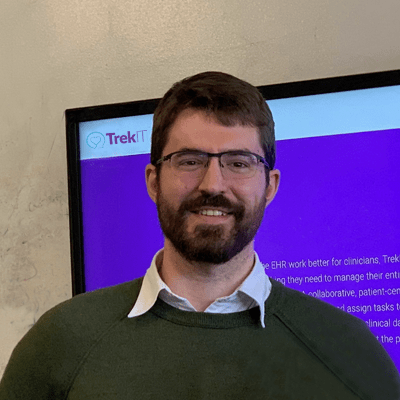Working as a medic was one of the most challenging experiences of my life.
For nearly two years, I would average 80 hours per week, sometimes peaking at 100 hours when relief called out sick.
It wore me down. Eat, work, sleep, repeat. Relationships suffered. Personal health suffered.
I think I knew mistakes were coming, but the slow fog that crawled into my mind was paralyzing. I’d be on autopilot, not giving tasks and treatment the proper attention.
And because there were no protocols, no warning signs going off, I was left to fight this crippling mental decay by myself. All 6’9 of me, caring for patients with dead-looking eyes through my glasses.
This was the early 2000s, where new technology was introduced and implemented at health systems, but physician burnout was not a “thing” yet. So, I kept working.
I remember the medication error, or at least trace moments of how it happened.
In normal 24-hour shift, we would get around 10-11 jobs, each taking between 45 minutes. We had a little over an hour, from initial dispatch to have the truck ready to go on another call. The overnights were typically slower, with a couple opportunities to close your eyes briefly — Except for that night.
The break before this call had been about 15 minutes, the longest so far that shift, we were already on call number 16. I couldn’t remember half of them.
This call was at a prison. The part I remember clearly was trying to figure out how on earth to get into jail.Weird what you remember, huh?
The next steps are not very clear in my memory, then or now. I do remember the sentiment that starting a line in a prison cell was surreal and then I remember being in the truck with a patient handcuffed to the stretcher. The Patient started seizing again, time for another round of narcotics. The meds work and we roll in the Emergency Department with a sedated but not seizing man, and gave our signout out to the ED staff.
My partner is helping me fill in parts of the story because I’m struggling with what happened. I remember what was running through my mind as I struggled with the details: How many rounds of narcs did I give? Two? Pretty sure two. [expletive] these are narcs, “pretty sure” isn’t going to cut it.
When I looked at my partner his face reflected the same. The radio squawked, “Two, are you guys clear yet, need you out here” My partner’s face fell, “No we are [expletive] not” he said under his breath as we cut our story to ED short.
Down to the pharmacy to replace meds. We had an arrangement with this hospital for restocking mid shift. Two tubes of Narcotic A. That’s the correct amount, right? No time to double check, in to the Narc case they go and we’re back in service. Ok dispatch, where to next?
Fast forward to the next day.
I remember waking up to a text from the second in command of the company, saying I needed to be there first thing in the morning. This was out of the ordinary, so I started running through the previous night’s call in my head..
Ok – our documentation wasn’t perfect, and I couldn’t recall every detail from the night before, but I’m pretty sure we did everything right – didn’t we? Man, I’m tired. Details are fuzzy. Did I use the right meds on the patient from the prison? The pharmacy gave us Narcotics A, so we must have used that one.
It wouldn’t be long before I had the consequences of my burnout (literally) laid out on the table for me in one of the hardest conversations of my career.
This is what burnout looks like. A medical professional trying desperately to keep up the impossible pace and requirements of the healthcare world, in an effort to help those in dire need, but ultimately pushing too hard and putting both the clinician and patient at risk. We assume the system checks will catch these mistakes, but in my case, many of them failed.
To read part 2 of my burnout series – The Consequences – click here (after May 17, 2019).


 PWeekly
PWeekly